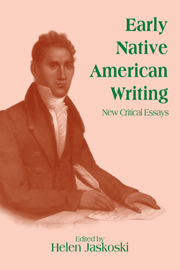Book contents
- Frontmatter
- Contents
- Foreword
- Preface
- List of Contributors
- 1 “Honoratissimi benefactores” Native American students and two seventeenth-century texts in the university tradition
- 2 “Pray Sir, consider a little”: Rituals of subordination and strategies of resistance in the letters of Hezekiah Calvin and David Fowler to Eleazar Wheelock
- 3 “(I speak like a fool but I am constrained)”: Samson Occom's Short Narrative and economies of the racial self
- 4 “Where, then, shall we place the hero of the wilderness?”: William Apess's Eulogy on King Philip and doctrines of racial destiny
- 5 “They ought to enjoy the home of their fathers”: The treaty of 1838, Seneca intellectuals, and literary genesis
- 6 “I am Joaquin!”: Space and freedom in Yellow Bird's The Life and Adventures of Joaquin Murieta, the Celebrated California Bandit
- 7 “This voluminous unwritten book of ours”: Early Native American writers and the oral tradition
- 8 “A terrible sickness among them”: Smallpox and stories of the frontier
- 9 “A desirable citizen, a practical business man”: G. W. Grayson – Creek mixed blood, nationalist, and autobiographer
- 10 “An Indian … An American”: Ethnicity, assimilation, and balance in Charles Eastman's From the Deep Woods to Civilization
- 11 “Overcoming all obstacles”: The assimilation debate in Native American women's journalism of the Dawes era
- 12 “My people … my kind”: Mourning Dove's Cogewea, The Half-Blood as a narrative of mixed descent
- 13 “Because I understand the storytelling art”: The evolution of D'Arcy McNickle's The Surrounded
11 - “Overcoming all obstacles”: The assimilation debate in Native American women's journalism of the Dawes era
Published online by Cambridge University Press: 20 February 2010
- Frontmatter
- Contents
- Foreword
- Preface
- List of Contributors
- 1 “Honoratissimi benefactores” Native American students and two seventeenth-century texts in the university tradition
- 2 “Pray Sir, consider a little”: Rituals of subordination and strategies of resistance in the letters of Hezekiah Calvin and David Fowler to Eleazar Wheelock
- 3 “(I speak like a fool but I am constrained)”: Samson Occom's Short Narrative and economies of the racial self
- 4 “Where, then, shall we place the hero of the wilderness?”: William Apess's Eulogy on King Philip and doctrines of racial destiny
- 5 “They ought to enjoy the home of their fathers”: The treaty of 1838, Seneca intellectuals, and literary genesis
- 6 “I am Joaquin!”: Space and freedom in Yellow Bird's The Life and Adventures of Joaquin Murieta, the Celebrated California Bandit
- 7 “This voluminous unwritten book of ours”: Early Native American writers and the oral tradition
- 8 “A terrible sickness among them”: Smallpox and stories of the frontier
- 9 “A desirable citizen, a practical business man”: G. W. Grayson – Creek mixed blood, nationalist, and autobiographer
- 10 “An Indian … An American”: Ethnicity, assimilation, and balance in Charles Eastman's From the Deep Woods to Civilization
- 11 “Overcoming all obstacles”: The assimilation debate in Native American women's journalism of the Dawes era
- 12 “My people … my kind”: Mourning Dove's Cogewea, The Half-Blood as a narrative of mixed descent
- 13 “Because I understand the storytelling art”: The evolution of D'Arcy McNickle's The Surrounded
Summary
In an apparent contradiction, Native American women argued both for Pan-Indianism and for many of the assimilationist policies of the Dawes Era in their early journalism. The journalism examined here reproduces, at times, dominant assimilationist discourse. However, it does not predicate assimilation on a rejection of Native identity and culture. Native women refused to accept Dawes Era ideologies that defined white dominant culture and traditional Native American cultures simply as binary opposites. Their early journalism demonstrates, I argue, a complex negotiation between Native and non- Native practices that suggests cultural dynamism rather than cultural loss as a paradigm for assimilation.
Native women wrote political journalism in English for Native American periodicals and the journals of the off-reservation boarding schools in the early twentieth century. Most of the women whose writing is examined here attended or were affiliated with offreservation boarding schools and were influenced by assimilationists like General Richard Henry Pratt. Many also belonged to a Pan-Indian organization, the Society of American Indians. I focus primarily on material from this society's journal, the American Indian Magazine, whose audience and contributors came from various tribes and white reform organizations.
The Dawes Era is generally represented as the period from the passage to the reversal of the General Allotment or Dawes Act (1887–1934). The act was named for its sponsor, Henry Dawes, who was an advocate of Indian assimilation and chair of the Senate Indian Affairs Committee.
- Type
- Chapter
- Information
- Early Native American WritingNew Critical Essays, pp. 190 - 203Publisher: Cambridge University PressPrint publication year: 1996



